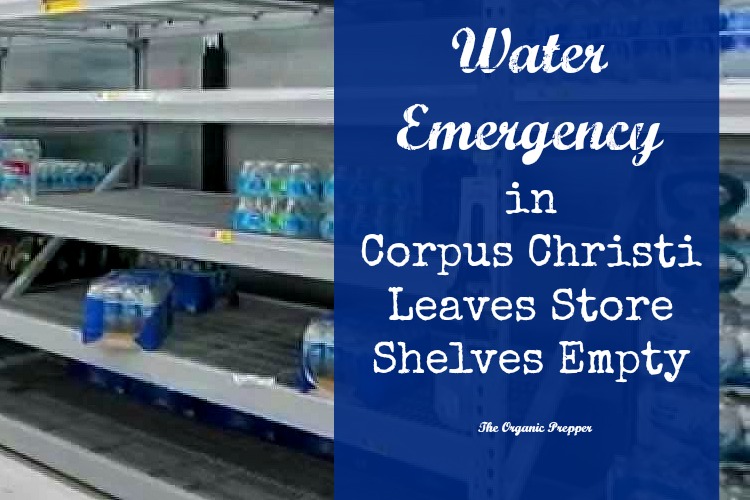If you're new here, you may want to subscribe to my RSS feed. Thanks for visiting!
By Daisy Luther
More than 300,000 residents in Corpus Christi, Texas have been warned not to drink the water flowing from the taps because a chemical used in asphalt may have contaminated the city’s water supply. There was an immediate run on bottled water at local stores by residents who were not prepared for a water emergency, causing merchants to limit purchases and put rush orders out to suppliers.
The chemical, Indulin AA-86, an asphalt emulsifier, may have tainted the supply after a “backflow incident” in the industrial area.
More than 300,000 people were notified late last night that they shouldn’t use the tap water for drinking or bathing out of “an abundance of caution.”
Slowing down water testing is the fact that initially, the industry at fault refused to disclose the make-up of the chemical that could be affecting the water supply of hundreds of thousands of people. CNN reported:
The city is still gathering information and had encountered delays because the chemical in the water is proprietary and has a patent, said city of Corpus Christi spokeswoman Kim Womack. The city had to sign a confidentiality agreement with the patent holder in order to get the specific makeup of the chemical.
The water emergency could get worse.
The company which is the source of the contamination could be unable to stop the leak. RT reported:
The possible contamination has been traced to an asphalt producer, Valero, on an industrial property where officials said there was no means to stop the leak.
Corpus Christi spokeswoman Kim Womack said city inspectors did not find a “backflow preventer” on the property. She said the company that owns the property and the one leasing it claims there is one.
Valero spokeswoman Lillian Riojas said it was a backflow program “from third party operations” near the company’s terminal.
“At this time, we believe this is a localized backflow issue…We do not believe this issue is being caused by Valero’s Corpus Christi refineries,”said the statement.
Valero Refining says that they are not at fault. The company has blamed “third party operations” for the water situation in Corpus Christi. (source)
It’s important to note that these types of contaminants cannot usually be filtered or boiled out. Bottled or stored water must be used.
There was an immediate run on bottled water.
It’s probably no surprise that local stores immediately sold out of bottled water. As every prepper knows, if you wait until the emergency is occurring, you’ve run out of time to prepare for it.
Photo: Chicago Tribune
At most stores, customers are limited to 3 cases of water at a time. Local businesses are working hard to accelerate their shipments of water.
Get prepped for a water emergency.
If you’re not prepped for a water emergency, keep in mind that this is not the only cautionary tale that has occurred in the United States lately. Everyone knows about the plight of residents in Flint, Michigan, but industrial accidents seem to be happening more frequently. Over the past few years, emergencies have occurred in West Virginia, Ohio, Utah, Alabama, and more locations across the country.
Many people worry about the unstable electrical grid, and the effects that this would have on life as we know it. However, what will cause death and illness even faster is a threat to the water supply. If you do not have a well, a nearby spring or fresh water source, and ways to filter the water, you could be in big trouble – life-threatening trouble – in a matter of days.
In my book, The Prepper’s Water Survival Guide, I wrote about the importance of water preparedness. It truly is an emergency that can happen to anyone.
If you don’t have at least a one-month supply of fresh pure drinking water properly stored, along with plans for long-term water sources, let this industrial accident be a wake-up call. An epic disaster doesn’t have to be a dramatic, end-of-the-world scenario.
A full month’s supply of drinking water for a family of 4 is about $150, give or take a little, depending on the prices in your area. You can also fill empty containers with tap water that can be safely used for pets, for flushing, and for cleaning and hygiene purposes. This is a small investment to make for your family’s security and well-being in the event of an emergency. You don’t want to be one of the people standing in line for whatever the government chooses to dole out to you or what is left on the store shelves after other people get there first.
If you never buy a single canned good or bag of pasta for long term food storage, please store water. You don’t have to be a conspiracy theorist to see the wisdom in being prepared for an event that could happen any place, at any time.
Resources:
The Prepper’s Water Survival Guide: Harvest, Treat, and Store Your Most Vital Resource
Prepper Hacks for Cleaning without Running Water















